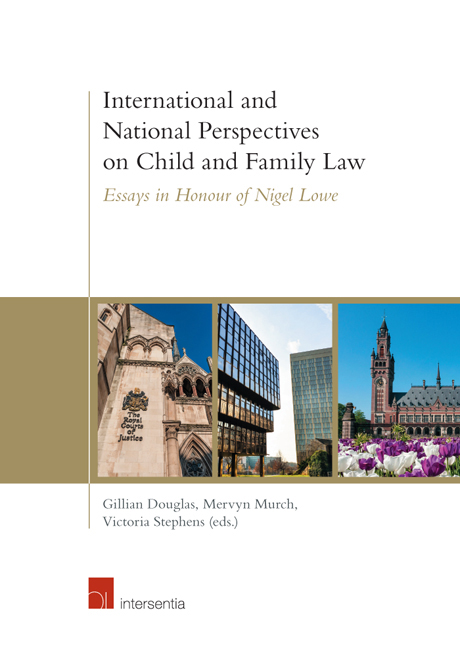Book contents
- Frontmatter
- Foreword
- Acknowledgements
- Contents
- List of Cases
- List of Contributors
- Introduction: Nigel Vaughan Lowe: An Appreciation
- Part I Family and Child Law in England and Wales
- Part II International Family Law
- Judging Parental Child Abduction: What Does it Mean to Adopt a Children's Rights-Based Approach?
- Judicial Activism: A 20-Year Evolution
- Globalisation of Adjudication in International Family Law: Serving International Families by Producing International Solutions
- Creating International Families: Private International Law and the Industry of Parenthood
- Issues in International Divorce Cases
- Non-Judicial Divorce in France: Progress or a Mess?
- The Istanbul Convention: Is Domestic Abuse Violence Against Women?
- Nationality and Migration Status in International Children's Law
- The Development of Child Protection Across International Borders for Children at Risk of Harm
- Nigel Lowe and International Family Law: An Immense Contribution
- The Spanish Constitutional Court and Protracted Child Abduction Proceedings: Time is of the Essence
- Non-Recognition of Child Marriages: Sacrificing the Global for the Local in the Aft ermath of the 2015 ‘Refugee Crisis’
- Juvenile Justice in Bulgaria: Reforms and Resistance
- Overriding Mandatory Provisions in EU Family Law Regulations
- Part III The Future for Family and Child Law
Nationality and Migration Status in International Children's Law
from Part II - International Family Law
Published online by Cambridge University Press: 12 October 2018
- Frontmatter
- Foreword
- Acknowledgements
- Contents
- List of Cases
- List of Contributors
- Introduction: Nigel Vaughan Lowe: An Appreciation
- Part I Family and Child Law in England and Wales
- Part II International Family Law
- Judging Parental Child Abduction: What Does it Mean to Adopt a Children's Rights-Based Approach?
- Judicial Activism: A 20-Year Evolution
- Globalisation of Adjudication in International Family Law: Serving International Families by Producing International Solutions
- Creating International Families: Private International Law and the Industry of Parenthood
- Issues in International Divorce Cases
- Non-Judicial Divorce in France: Progress or a Mess?
- The Istanbul Convention: Is Domestic Abuse Violence Against Women?
- Nationality and Migration Status in International Children's Law
- The Development of Child Protection Across International Borders for Children at Risk of Harm
- Nigel Lowe and International Family Law: An Immense Contribution
- The Spanish Constitutional Court and Protracted Child Abduction Proceedings: Time is of the Essence
- Non-Recognition of Child Marriages: Sacrificing the Global for the Local in the Aft ermath of the 2015 ‘Refugee Crisis’
- Juvenile Justice in Bulgaria: Reforms and Resistance
- Overriding Mandatory Provisions in EU Family Law Regulations
- Part III The Future for Family and Child Law
Summary
GLOBAL CHILDHOODS
Children belong to families, to communities, to nations and to the world, and sometimes these different types of belonging lead to conflicts. The reality of globalisation is that children's lives are dynamic: they move with their families, they move to join new families, and they move independently. They move with and without documentation or permission, in and out of countries where they hold citizenship. Sometimes children stay put while their parents move away, for work or for love, by choice or compulsion. As a result of this movement, a child's sense of identity and belonging may be layered and complex.
For international family law, the reality of children and families in motion creates two sets of problems. The first is addressed by conflict of laws rules on jurisdiction, choice of law, and recognition of judgments, which attempt to assign decision-making responsibility to one of the multiple places where a child has significant ties. In international cases, the Hague Children's Conventions rely on habitual residence as the primary connecting factor for assigning jurisdiction and for other purposes. This approach recognises that older notions of domicile and nationality are no longer adequate to define the connections between people and places. Yet the use of habitual residence has risks as well. It may tend to freeze the status quo, even for children and families with deeper ties to other places. There is the potential in these cases for the inquiry into habitual residence to become the whole analysis, defining where children will remain, rather than just its first step.
A second set of legal problems in these cases, less well explored, comes from the laws governing citizenship, immigration, and asylum that regulate cross-border movement. There may be considerable tension between the lived experience of children and their families and the hard realities imposed by these rules. This tension surfaces in immigration cases, but it is also a factor in parental responsibility and child abduction disputes. With its focus fixed on habitual residence, however, international family law sometimes fails to notice the central role of nationality and immigration status in many parenting disputes.
- Type
- Chapter
- Information
- International and National Perspectives on Child and Family LawEssays in Honour of Nigel Lowe, pp. 219 - 232Publisher: IntersentiaPrint publication year: 2018



